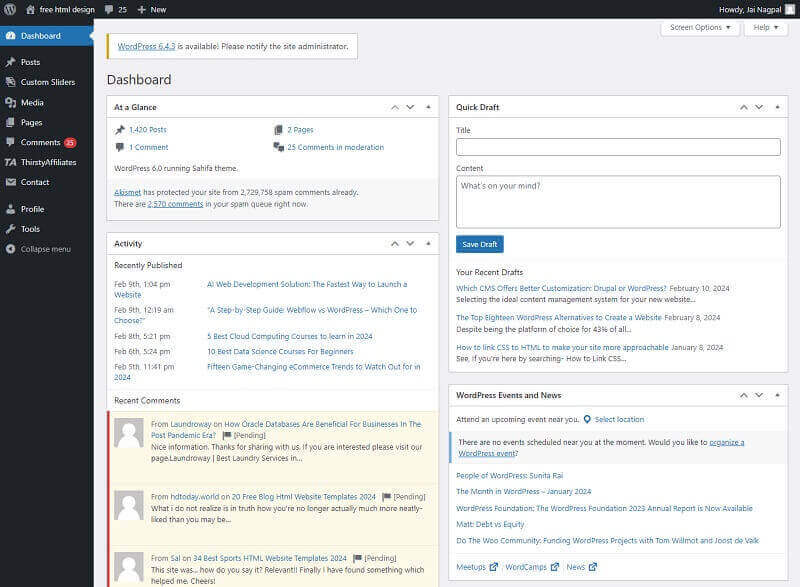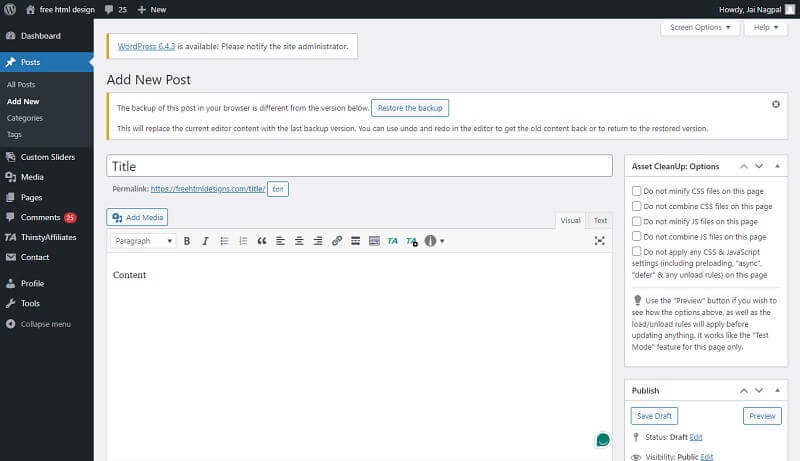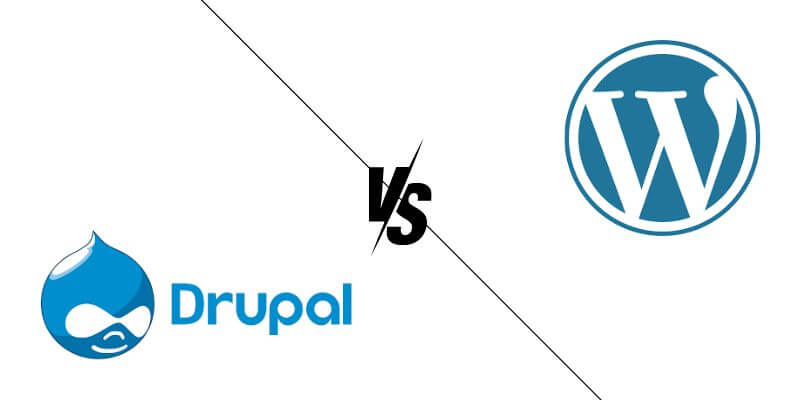Are you also tired of thinking? Drupal Vs WordPress which one offers better customization? Selecting the ideal content management system for your new website is crucial. When creating a website from scratch, you will likely use a content management system (CMS) to assist with site management and design.
Which CMS, though, is the greatest fit for you?
With a combined market share of more than 60%, Both are leading the CMS market.
Every one of them has a devoted fan base and its online community. Furthermore, Both powers some of the biggest websites on the internet.
Drupal is more tailored to developers and offers more customization options, whilst WordPress is more user-friendly for beginners. This is the primary distinction between the two platforms.
We’ll examine both relative merits in greater detail below. To find the answers to the following queries, continue reading:
- Which is more user-friendly?
- How are they handling content management?
- Which moves more quickly?
- Which platform is the safer?
- Which content management system provides the most flexibility?
Selecting between WordPress and Drupal can be difficult. With any luck, after reading this piece, you’ll be well-equipped to select the best option for your new website.
- Drupal vs. WordPress: Usability
- SEO for WordPress vs Drupal
- Drupal vs. WordPress: Quickness and Efficiency
- Security Comparison of Drupal vs. WordPress
- Flexibility: Drupal vs. WordPress
- Drupal Benefits
- WordPress Benefits
- FAQ: Drupal vs. WordPress
- Conclusion
Drupal vs. WordPress: Usability
Using a content management system (CMS) can greatly simplify the process of creating and maintaining a website. With the advent of content management systems, anyone with no technical background can now create a visually appealing and useful website.
Discover which WordPress vs. Drupal winner is in our comparison below, as well as how simple it is to use each platform.
Drupal
Drupal is relatively simple to install if your web host is beginner-friendly. You will be able to install multiple CMS from the backend of your hosting environment.
It comes with several installs known as distributions. If you know what kind of website you want to build, you can select one of these over a blank installation.
After installing it with CMS hosting, you will have access to a wide range of customization choices.
However, this is when the learning curve quickens. Most site modifications, aside from the most basic ones, require programming knowledge of HTML, PHP, and other languages. You’ll now need to hire a developer if you are unable to program.
Once you spend some time using WordPress, you will astound yourself with what you can achieve, even though you may encounter a slight learning curve.
WordPress
The fact that WordPress is so simple to set up and use is one of the key reasons it is so popular.
In only a few minutes, you can install WordPress on your host. The majority of hosting environments, such as Hostinger’s WordPress-managed hosting, provide an easy one-click install that guides you through the installation procedure.
Upon activation, WordPress will present you with an easy-to-use dashboard.

This is your hub, where you can edit your site, add content, and install themes and plugins.
The “Appearance” tab is where you handle all theme adjustments. Furthermore, you can always install a drag-and-drop builder like Beaver Builder or SiteOrigin to make the process of creating your website even simpler.
Content creation is simple. You’ll be at ease if you’ve ever used a basic word processor.

It’s easy to add posts and pages by just typing into the editor, dragging images in, and hitting the publish button.
Summary
Choose WordPress if you want the process of creating your website to be as simple as possible. The user-friendly dashboard makes it simple for users to install WordPress quickly to install themes, and plugins, and create content.
If you know how to code, you can do a lot with Drupal. The installation procedure is easy to follow. But, if you lack technological expertise, you may encounter problems when you begin personalizing your website.
SEO for WordPress vs Drupal
Now that your website is complete and available on the internet, you just need to upload your content. But there’s still work to be done.
After your website is initially built, you will still need to make frequent updates, fix any problems, and perform SEO optimization.
The comparison of each platform is shown below.
Drupal
If you’re not a developer, it can be challenging to keep your website updated. It cannot be updated from within the user interface. It is therefore likely best to have a skilled developer complete the operation.
Notwithstanding the challenging updating procedure, It performs admirably in terms of SEO. The CMS has built-in coaching and other SEO best practices in mind. Additionally, there are other add-ons available, such as Yoast SEO, that can improve your SEO even more.
It has a considerably smaller community than WordPress, yet it is still highly helpful and supportive. It appears that developers predominate in the community rather than novice consumers.
WordPress
You may easily edit any part of your website with WordPress. from the WordPress core to plugins and your theme. With just a few clicks from the WordPress dashboard, everything is done. Maintaining the most recent version of your website is crucial for preventing security vulnerabilities.
Beyond making sure your website is always running the most recent version, though, you undoubtedly have other worries as well, such as traffic.
Fortunately, WordPress has good SEO optimization built right into it. Moreover, Yoast SEO plugins can be installed to enhance your optimization efforts.
Lastly, don’t worry about any problems you encounter, including plugin incompatibilities.
Summary
All things considered, WordPress makes website management and updating very simple. For individuals developing their first websites, however, it’s a no-brainer because of the simple SEO integration and helpful community.
Drupal has a vibrant community and strong SEO capabilities, however, novices find it extremely challenging to update their websites regularly due to the challenging update procedure.
Drupal vs. WordPress: Quickness and Efficiency
It is essential that your website loads quickly if you want to rank well in search engines and please visitors.
Even if your website is the most gorgeous thing on the planet, people won’t stay to view it if it loads slowly.
We examine each platform’s measures to guarantee optimal performance below.
Drupal
It can be used to create websites that load quickly and operate incredibly well. This is largely due to the CMS’s low resource requirements. This enables quicker reaction times and lightning-fast server connectivity.
It is also more capable of managing websites with thousands of pages as a result. To further enhance performance, you will also be able to add more extensions, such as those that enable webpage caching.
WordPress
WordPress has several major shortcomings, one of which is its speed. Not that it can’t happen quickly, but many webmasters fail to properly optimize their websites. You can achieve a really quick website if you know what you’re doing and even make the effort to use WordPress performance best practices.
In essence, WordPress has amazing performance to offer. However, loading times and overall performance will decrease if you utilize many plugins, have a theme with bad coding, and neglect to properly optimize.
On the other hand, you can achieve a very fast website by optimizing your WordPress pictures, using a website cache plugin, selecting a reliable host, and downloading a reputable theme.
Summary
Drupal likely operates faster out of the box. Undoubtedly, it’s a lighter CMS. It will be more challenging to set up and configure your website to work to its fullest.
WordPress can load in milliseconds or, on occasion, appear to take an eternity. Everything is dependent on the webmaster, the host, and how well your site has been optimized. The good news is that optimizing a WordPress website for performance is simple even for complete novices, as it usually only requires installing and configuring a few plugins.
Security Comparison of Drupal vs. WordPress
Regardless of the type of website you’re creating, security is a top priority. Currently, there is no such thing as 100% secure online. As an alternative, you ought to aim for the maximum amount of protection that you can.
Let’s compare the content management systems to see how both approach security.
Drupal
It has established a solid reputation as one of the safest content management systems out there throughout time. You can be sure that it meets strong security standards because it powers federal websites like the White House website (interesting fact: they moved to WordPress).
Security flaws it have occasionally occurred, primarily related to SQL injections, however, these have always been promptly fixed.
It takes security very seriously, that much is clear. It is less vulnerable to hacking now that it runs on fewer websites and has a smaller marketplace for themes and plugins. Its security requirements are still very strict, though.
WordPress
The core of WordPress is extremely safe. More security flaws are produced, nevertheless, by the widespread use of third-party plugins and themes.
Additionally, since it is such a widely used CMS, it is far more likely that security risks will affect it. The CMS that gets hacked the most frequently is WordPress. But don’t let that frighten you.
You are capable of overcoming these security flaws. More often than not, hacking is the result of a webmaster error or utilizing an out-of-date plugin; CMS vulnerabilities are less common.
Installing a badly developed plugin or theme is more likely when using WordPress due to the vast ecosystem of plugins and themes available.
You may lessen the likelihood of any security flaws, though, by adhering to WordPress security guidelines.
Summary
In general, there is a lower likelihood of Drupal hacking. There are two possible causes for this. Firstly, since their market share is lower, the likelihood of attackers targeting their sites is considerably lower. Two, most security flaws originate in the smaller plugin and theme ecosystem.
If you take the necessary precautions to safeguard your website, WordPress may be extremely secure. The WordPress core is very secure, as you have just discovered. However, if you don’t thoroughly inspect your themes and plugins, your website may be vulnerable.
Flexibility: Drupal vs. WordPress
Since you’re most likely not a web developer by trade, you’ll be developing and customizing your website with themes and plugins.
Because are both open-source, you may create the website of your dreams and effortlessly add functionality without needing to know how to code.
Furthermore, you can create a headless CMS with the help of them websites. Activate the distribution of your material to your blog, apps, and social media accounts through the APIs provided by both platforms.
Drupal
Modules and extensions are used for customizations. Themes and plugins provide customization options, much like WordPress does.
You can so significantly alter your website. If you don’t know how to code, though, it can be more difficult to apply these adjustments. It’s not as easy to find, install, and configure the majority of these extensions as it is with WordPress.
Skilled developers usually create websites on demand, and this is the usual reason for their distinctiveness.
You’ll probably need to buy a professionally developed Drupal theme or look into some of the free options if you lack the necessary development skills.
Additionally, you can incorporate services like Yoast, Twitter, Shopify, and more into your website through the already-existing marketplace for modules.
WordPress
WordPress offers a vast array of themes and plugins. You will use a theme to create the framework of your website, and plugins will provide additional functions.
In addition to a vast collection of free plugins and themes, the majority of themes and plugins also have paid versions available. Usually, the premium versions have better quality, a larger feature set, or professional support.
You can use WordPress to create any kind of website you want.
Summary
WordPress is the best option if you’re just starting and want greater control over the look and functionality of your website. You will have a hard time creating something new using Drupal because of its quite steep learning curve.
However, It can be a good option if you know how to code because it will allow you to modify your website anyhow you see appropriate.
Drupal Benefits
It provides you with strong performance, extensive content customization possibilities, and excellent security.
The following are some of the main benefits:
- Able to assist teams with varying backgrounds. Its sophisticated permission control system makes managing and controlling users simpler. Compared to WordPress, it provides you with more depth and versatility.
- Multilingual support built in. The core installation comes with multilingual support. You may easily develop a website that supports various languages if necessary.
- Excellent for organizing content. You can utilize its extensive taxonomy system if you have a diverse range of materials. It is highly adaptable and may be tailored to your specific content needs.
- Strong ability to customize content. It supports a variety of custom page kinds and content types. It comes with built-in capabilities, yet you can add more like to WordPress. Furthermore, its customization is inexpensive because all you need to do to have your website up and running is pay for hosting and a name.
WordPress Benefits
WordPress excels in terms of adaptability, user-friendliness, and community size and support.
The following are some of the main benefits that WordPress provides:
- It is simple to operate. Once you spend some time using WordPress, you will be astounded at what you can achieve, even though there is a slight learning curve. Compared to Drupal, it’s far simpler to use, especially for novices and non-technical webmasters.
- It is adaptable. You don’t need to pay a developer to create the website of your dreams thanks to the vast theme and plugin marketplace.
- It can be quite affordable. With completely free themes and plugins, you can rapidly create a working WordPress website without the need for hosting or a domain name.
- An enormous virtual community. Conduct a Google search to easily find the solution to any problem with your website, whether it’s support-related or not. Moreover, numerous websites dedicated to WordPress can help you quickly advance your knowledge.
FAQ: Drupal vs. WordPress
What Distinguishes Drupal from WordPress Mainly?
Drupal and WordPress both provide excellent scalability options to help you expand your website. The primary distinction is that Drupal publishes content to the web along with numerous additional platforms, such as mobile apps and kiosks, whereas WordPress prioritizes websites.
Is Drupal Less Popular Than WordPress?
Because of its enormous global community, ease of use, and frequently reduced development costs, WordPress is one of the most popular content management systems.
Is It Possible to Switch From Drupal to WordPress?
Yes, you can easily switch from a Drupal to a WordPress website. Nevertheless, a manual migration from Drupal to WordPress is required.
Conclusion
Selecting the best CMS for your website is a crucial first step toward its development. If you select the incorrect CMS, you will face an uphill battle right away.
Drupal is a reliable CMS all around. It is performance and security optimized from the start and comes with a plethora of features out of the box. It has a fairly steep learning curve despite being very adaptable. WordPress is a good option if you want to quickly develop your website without having to spend time learning how to program.
An extremely user-friendly and straightforward CMS is WordPress. Even though you can create incredibly expansive and intricately customized websites (like Mashable), it’s still quite user-friendly for novices.
You can position yourself for success by choosing a reliable theme, the ideal selection of plugins, and a top-notch host. WordPress is so widely used that you can find a ton of tutorials and support resources to help you solve any problems that may arise.
Our analysis shows that WordPress is superior in the end.
It’s your turn now. Which CMS is your favorite, and why? Kindly leave your remarks in the space provided below.



